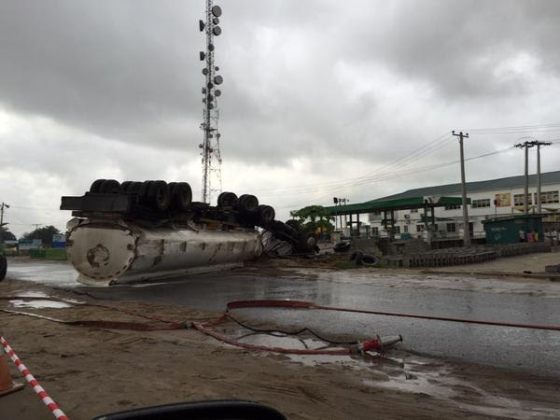Features
Adefolake Adekola: Oil Spillages Have Even Worse Effects Than You Think
 Often times, Nigerians believe oil spillage only refers to the spilling of petroleum oil, but that is not true. Oil spillage is when any type of oil escapes from the container. Just last month, kegs of vegetable oil being transported by a trader spilled into the gutter and people recorded her scooping the oil back into another container. Watching the video was disturbing as I could only imagine the consumers who would use the oil to cook or fry and the health implications thereafter.
Often times, Nigerians believe oil spillage only refers to the spilling of petroleum oil, but that is not true. Oil spillage is when any type of oil escapes from the container. Just last month, kegs of vegetable oil being transported by a trader spilled into the gutter and people recorded her scooping the oil back into another container. Watching the video was disturbing as I could only imagine the consumers who would use the oil to cook or fry and the health implications thereafter.
It’s no news that there is an abundance of crude oil in Nigeria, predominantly in the Niger Delta region. According to Kadafa, Zakaria and Othman (2012), Nigeria is ranked 3rd world’s largest producer of palm oil and the the 6th largest exporter of crude oil. It is said that 80% of our revenue in Nigeria is generated from crude oil and 97% of Nigeria’s export is crude oil.
In as much as there are laws and regulations governing oil spillage in Nigeria, such as Oil Pollution Act (OPC) 1990 and Mineral Oil Safety Regulation 1963, we still see large amounts of oil spillage across Nigeria. Tankers spilling petroleum on major highways and roads, leading to explosions and severe accidents.
Causes of oil spillage are:
- Man-made:
- One of the major causes in Nigeria is illegal bunkering and vandalization
- Tanker accidents
- Oil siphoning
- Natural:
- Movement of tectonic plates
- Natural seepage, especially in oceans
Oil spillage has caused environmental and health degradation in various parts of Nigeria, leading to food insecurity. Crops and livestock find it difficult to survive, and those that survive are heavily contaminated with heavy metals, which lead to diseases. Several studies conducted has shown that oil spillage causes adverse health, environmental and economic effects in Nigeria.
Health Effects of Oil Spillage
- Cardiovascular diseases
- Ingestion of toxic metals
- Skin ulcer
- Damage to the kidney and liver
- Mammals get hypothermia
- Swelling of the brain
- Increased blood pressure
- Health hazard to aquatic animals and plants
- Difficulty in breathing
Environmental Effects of Oil Spillage
- Water pollution
- Soil pollution
- Oil contamination
- Explosion can lead to air pollution
- Damage to ecosystems
- Coastal and riverbank erosion
- Flooding
- Sewage and wastewater pollution
- Acid rain
- Deforestation
Economic Effects of Oil Spillage
- Risk of food insecurity
- Poverty
- Job insecurity
Recommendations
It is important to note that no two oil spills are the same because of the variation in oil types, locations, and weather conditions involved.
A. Provision of better clean-up techniques to remove oil from natural environment.
B. Enforcement of already established oil exploration policies.
C. Proper maintenance of vessels and pipelines.
D. Leave the oil alone for natural dispersion. “If there is no possibility of the oil polluting coastal regions or marine industries, the best method is to leave it to disperse by natural means. A combination of wind, sun, current, and wave action will rapidly disperse and evaporate most oils.”
E. Controlled use of chemical dispersants.






















